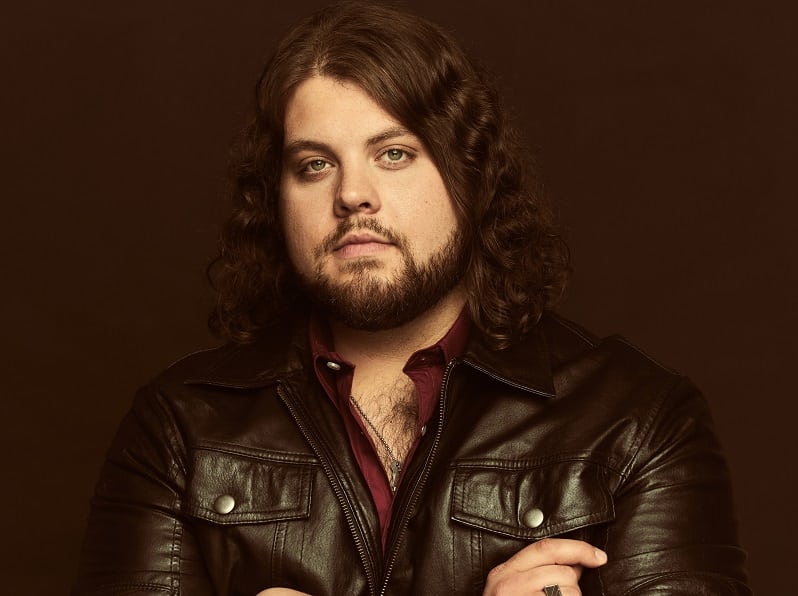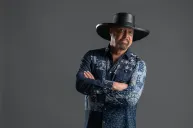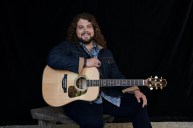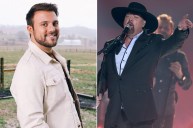Dillon Carmichael calls his debut album Hell on an Angel, out Aug. 17 on Riser House Records, his "dream record." The young Burgin, Kentucky native didn't catch lightning in a bottle, lucking into a set of songs that caught the attention of producer Dave Cobb. Instead, his dream come true is the culmination of a lifelong journey.
Born in 1993, Carmichael can't remember a time when his mom's brothers Eddie and John Michael Montgomery weren't country stars. Carmichael chased his own Neon Rainbow at a young age, receiving his first guitar at age 11. A fascination with swampy Southern rock, classic honky-tonk and the country songwriting of Vern Gosdin, Waylon Jennings and Merle Haggard garnered talk of a publishing deal by age 17.
A former high school phenom instead of an overnight success, Carmichael sings and writes raw, honest country songs seeped in the sort of real-life experiences he shares with other small town Americans. That's why one of the youngest veterans in Nashville is worth watching as his debut reaches fans of Sturgill Simpson and other home state beneficiaries of Cobb's magic touch.
Wide Open Country chatted with Carmichael recently about his path to Nashville, his famous uncles and traditional country's most sought-after producer.
WOC: Just from reading up on you, you were a teenager when you first came to Nashville...
Carmichael: I moved to Nashville when I just turned 19, but I was 17 when I got offered a publishing deal. I started writing in Nashville immediately.
Had you been coming down to Nashville to do some work before you got a publishing deal, or did you just go into it blindly and the pieces fell into place?
The lady that offered the publishing deal set me up. Even though we hadn't signed the deal officially yet, she had me coming down and writing on a regular basis when I was still in high school. She said I had to turn 18 and graduate from high school before I could sign a contract. It's kind of an interesting situation.
With family involved in the business, was there ever any temptation to rebel and not do country just because you might've thought it was expected of you?
No, I've always had a lot of respect for what my family does. I've always been happy to be a part of the same world that they're in. I've never felt the need to kind of rebel against it. I've loved country music from the time I was very young anyway. It wasn't an issue for me.
Do you ever talk to your uncles about country music? Do they maybe give you advice they wish they'd heard when they were your age?
Yeah, they've been through all the ups and downs of the music business, from contracts to playing live shows and hiring a band, entertaining folks and writing songs. All the stuff that goes into being what I am, they've done it all over and over again. There's definitely been times when I asked them for advice, and they openly gave me advice and helped me through a lot of situations. Especially with the business side of it, which I don't particularly have a knack for.
We're very close on the business aspect and the personal aspect. I've been doing a couple of shows with uncle Eddie, Eddie Montgomery of Montgomery Gentry. I've done shows with John Michael, and we're definitely close. They've been an impact on what I'm doing.
Your uncle Eddie is such a showman. Do you take any inspiration from just watching him have a ball on stage?
Absolutely. I wish sometimes that I was able to do that. Not that I'm not able. It's just my style is a little different. My music is different. All of that is based on the way it feels. A lot of his songs are driven and open to that high energy thing. A lot of mine are swampy blues or country kind of like Keith Whitley, although we do have a few upbeat songs. I do get a lot of the way I address the crowd, and I've definitely learned to be my own style of entertainer, by watching my uncles and my mom.
My mom (Becky Montgomery) has been a singer. She didn't make it near as far as them, simply because she quit going to make Nashville visits because she was raising us kids. The way it worked out, she wasn't able to juggle all of that at the same time. But I learned to entertain and sing by watching her.
My grandfather on my dad's side was an entertainer, as well (with Southern gospel quartet the Carmichael Brothers). I learned from him. He loved Elvis, and he always told me that I need to watch how Michael Jackson entertains crowds and how Elvis makes people laugh.
I guess music and traveling is in your blood, then.
Absolutely. A gypsy at heart, no doubt. I'm starting to get busy traveling now, and I've got to say that I love it.
We talked about your uncle Eddie. When you look at John Michael Montgomery's hits, there's so many different kinds of songs. There's the saddest songs you'll hear and also funny songs. Does he inspire you to open up your repetoire to different sounds?
As far as the content of the songs, I'm open to any kind of story or any kind of topic. As far as the style goes, I pretty much stick to traditional country and Southern rock. I don't venture too far from there.
How did you hook up with Dave Cobb? He seems like the perfect producer for the kind of music that you do.
One of the people at the record label had a mutual friend, and it's kind of those deals where it's like, "Hey, I don't like to do this, but just this one time can you get us hooked up with a meeting?" That person likes my music and what I'm doing, so they hooked it up. We got a meeting set up with Dave, and we went in blind. Our communication was limited with him, because he was so busy cutting the last Chris Stapleton record. He's very, very, very busy winning Grammys, doing media and working with all the artists that are cutting new records. I'm not sure what they said to make him say yes, but he took a 30-minute meeting.
So I walked in and Dave didn't know me from Adam and I had never met him. We just kind of started talking. We didn't talk about music. We talked about where we're from, our families and what we do for fun. We got to know each other for that first 30 minutes. He said, "Well, I guess if I'm going to consider being your producer, I should hear a song first." I played him one song. I played him "It's Simple."
As I left the building, he said, "Hey man, I'd love to produce your record." I don't think I said anything. I just walked away because I didn't even know how to respond to that. I figured he'd take a couple of days or a week to get back with me on whether or not he wants to produce it, if he even gets back with me. I wasn't expecting him to say right then and there, "I want to produce your record."
What was it like working with a producer with a lot of experience with other traditional-minded artists?
He had an incredible way of reading my heart and my mind on what I wanted to do. He wants to record songs that aren't looked at as a marketable object. He just wants, "This one is your truth." He had a sixth sense about what was my truth.
He told me when he first went in that he didn't want to know any of the business side of anything. This is the art part of what you do. He didn't want to know right off the bat who wrote the songs. He said, "I don't care if, you know, Justin Beiber wrote it. If I like the song, I like the song. I don't want to know if you wrote it or if four other people wrote it because that can become political. I know a lot of songwriters, and I know you know a lot of songwriters. We don't want that to affect our decision-making."
So I played him songs, and he didn't want to know who the songwriters were. He particularly liked songs I had written by myself. That's a sworn example of him knowing that's my song that came from my hand without any outside influence. He gets me as an artist.




